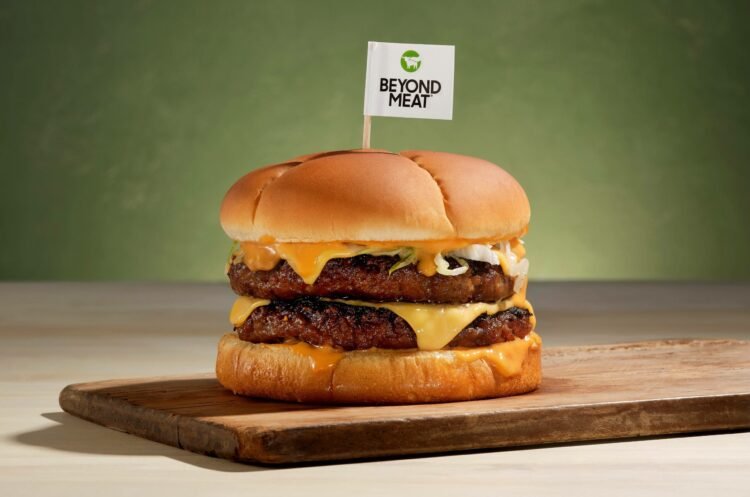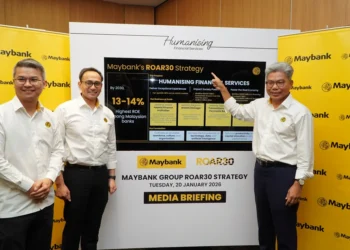There is some reporting that Beyond Meat, the meat-alternative parent of Beyond Burgers and more, is headed for Chapter 11. Apparently, the brand’s last quarter was an even bigger disappointment than previous quarters.
Founder and CEO, Ethan Brown, opened the latest earnings call with these statements,
“We are disappointed with our second quarter results, which reflect ongoing softness in the plant-based meat category, particularly in the U.S. retail channel and certain international foodservice segments.
“Before diving into details on the quarter, this level of disruption to a recovery requires broader commentary. Though we saw a return to top-line growth in the back half of 2024, the first 2 quarters of this year indicate the need for a fundamental reset for our brand and category.
“To stabilize our business and with a goal to achieve EBITDA positive operations within the second half of 2026 and to realize our much longer-term objective of reshaping global protein markets in support of a healthier and more sustainable future, we are taking significant and immediate actions.
This article is part of Branding Strategy Insider’s newsletter. You can sign up here to get thought pieces like this sent to your inbox.
Mr. Brown listed the actions as follows,
- Hiring of John Boken from AlixPartners to become Chief Transformation Officer. Mr. Boken’s remit is cost-cutting, margin expansion, and operational efficiency.
- Global cost-cutting, including the elimination of a percentage of the workforce.
- Intensification of the gross margin activities, which include elimination of non-performing products, renovation of some existing products, cost-cutting around specific production lines, reducing supply chain costs and logistics costs, and making changes to production levels – all in the hopes of “realizing gross margin recovery even with lower volumes.”
- Expanding distribution of core products with new retail channels.
- “… use Beyond as the primary brand and an Empire. We have been formerly using a shortened market in certain instances for some time now and believe it provides for reduced emphasis on facsimile, a now complicated frame that overshadows the real high-quality protein offerings we provide to consumers and a widening of our aperture beyond animal protein replicates, so that we have the freedom to as and when appropriate to do so, meet broader consumer protein needs.”
- Focus on strengthening the balance sheet.
Summing up the actions, Mr. Brown opined:
“With this high-level context and a clear and comprehensive action plan in place, including a specially appointed interim Chief Transformation Officer, deeper operating expense reduction, increased focus on gross margin expansion across our core product lines, the implementation of new U.S. retail distribution for core product lines, the kickoff of a rolling brand repositioning and continued heightened focus on strengthening our balance sheet….”
All of this makes sense. However, many analyst questions revolved around how Beyond Meat would manage resuscitating both the top line and the bottom line with these specific efforts. There seemed to be analyst skepticism around how Beyond Meat will recapture lost users.
Beyond Meat believes that the opportunity for plant-based alternatives is strong, with a lot of interest in the brand: the health headwinds are in its favor.
The focus on using the name Beyond across the various offerings is important. However, as the brand’s history reveals, its promise has never been clearly explained to consumers. Beyond Meat has never provided any reasons for choosing its offerings over other plant-based meat alternatives. If you believe that how you run your brand is how you run your business (and vice versa), then Beyond Meat needs to spend a lot more time on its brand.
As a marketer, your job is to compete. Compete differently with The Blake Project.
Why?
For starters, Beyond Meat’s value equation is out of whack. The customer’s value equation assesses the brand’s worth by focusing on the total brand experience (functional benefits, emotional and social rewards, reflection of customer values and brand personality) relative to the total costs (money, time, and effort). Essentially, Mr. Brown’s list of “to-dos” focuses on brand costs, rather than the total brand experience or the brand promise.
A Brand Promise Problem
Just what is the relevant differentiated experience that Beyond Meat will deliver to the customer every time? Beyond Meat has not been able to communicate just what it is that makes its experience relevant and differentiated from competitive options. Tragedy. Why? Because there was and probably still is a relevant differentiated experience.
At its inception, Beyond Meat had one key competitor, Impossible Foods. Both Beyond Meat and Impossible Foods had two different messages about the future of food. Beyond Meat’s proposition centered on its connection to nature. Beyond Meat focused on the purity and simplicity of simple, raw, protein-rich, non-GMO ingredients as the better way to the future. Beyond Meat’s ingredients were ones that we could recognize. Beyond Meat’s products are designed to taste like familiar animal protein, achieved through basic cooking techniques using plant-based ingredients, with no antibiotics, cholesterol, or hormones.
Impossible Foods emphasized a scientific, lab-based approach. Impossible Foods touted its signature element Heme – this is what makes the burger “bleed” and taste like beef. As described on the Impossible Foods website, “Heme is what makes meat taste like meat. It’s an essential molecule found in every living plant and animal — most abundantly in animals — and something we’ve been eating and craving since the dawn of humanity. Here at Impossible Foods, our plant-based heme is made via fermentation of genetically engineered yeast, and safety-verified by America’s top food-safety experts and peer-reviewed academic journals.”
Impossible Foods was all about science. Impossible Foods CEO, Patrick Brown stated: “Start with the hard fundamental research required to understand the basic principles and molecular mechanisms responsible for the flavors, aromas, textures, and juiciness that make meat delicious and craveable; then, discover scalable plant sources of the specific proteins and other nutrients required to reproduce the magic of meat.”
Originally, the two brands’ relevant differentiators were either “Made by Chemists” or “Made by Nature,” “Food Science” or “Food Authenticity,” “Scrumptious by Science” or “Scrumptious by Simplicity.” Initially, the two brands had different distribution strategies. Beyond Meat chose retail distribution. Impossible Foods chose restaurant distribution.
Neither brand made a compelling case to the customer in a mass market manner. The communications were non-animal protein, save the planet. You needed to visit the websites to know all of the food processes, ingredients, and benefits.
It remains a puzzlement. Why did Beyond Meat not spend more time brand building? A brand is a promise of a relevant, differentiated experience. Without a relevant, differentiated brand experience, you have a product not a brand. This appears to be the situation now. Sure, making Beyond into an Empire with brand extensions is a potentially viable and profitable strategy. But, first, Beyond Meat needs to define for the customer… not just analysts… what Beyond stands for in customer language.
A Trust Deficit Problem
During the recent analyst call, CEO Brown reiterated that Beyond Meat suffers from “misinformation around the products.” He indicated that watching the 9-minute video on the website would help. (Seriously, 9 minutes? We live in a world where 1 minute seems to be an eternity. We want same hour service not sagacity.)
Pricing is a problem for Beyond Meat. Mr. Brown believes there is too much misinformation around Beyond Meat’s pricing. Yes, Beyond Meat is a pricier option relative to some animal protein offerings. Mr. Brown blames the explosion of competitive brands that “unsettled” the category of plant-based protein. A decent market segmentation might help. Is Quorn, a fungus-based option that is not always vegan, a viable alternative to Beyond Meat? Mr. Brown blamed the shift in grocery placement from refrigerated to frozen … “ in an uncoordinated way.” This chilled-to-frozen move “dislocated” the brand and affected customer purchases. He blamed the limited availability of the products on distributor issues. Mr. Brown blamed the “negative narrative around the category.”
Sure, lots of blame to go around. But, do I trust the brand?
Beyond Meat has a trust deficit. Customers and prospective customers are concerned about how the product is made. Being “processed” is now a negative. Beyond Meat products are perceived to be too processed. For vegans, vegetarians, and organic eaters, processed is a dirty word. Trust is an essential element for a brand.
There are many more reasons why Beyond Meat has a trust deficit. Beyond Meat did not appear to have built a compelling, relevant, or differentiated brand. Rather, Beyond Meat always seemed to be a company with innovations. Beyond Meat never seemed to communicate its benefits to customers and prospective customers. Beyond Meat products have been and still are priced at a premium to animal proteins. Beyond Meat wants people to believe that Beyond Meat products are OK to eat; not processed, but created.
Beyond Meat’s trust deficit is self-created. At Beyond Meat, there has always seemed to be a sense that people would overlook the product-processing because the idea of plant-based proteins was so enticing. Consumers are not like that anymore. “Trust me, this is good for you and sustainable” is not a viable message.
To add to this, data show even when people learn that huge reductions in meat consumption are essential for climate-change avoidance, people are reluctant to change behaviors when the environment is “the sole beneficiary”. Self-interest overcomes altruism. A different study from Purdue University shows that even when confronted with information about meat’s carbon footprint, people still prefer meat over plant-based alternatives
Building trust is not on the recent Beyond Meat agenda. John Boken does not have trust on his list of actions. Beyond Meat must build trust. Brands live and breathe with trust. Without trust, brands have little value.
There is no question that Wall Street loves to hear about margin increase. Wall Street applauds cost-cutting. But Wall Street has lived through quarter after quarter of bad news from Beyond Meat. Let’s not forget, however, customers do not care about your margins. Customers care about trustworthy brand value.
Cheerleading from Mr. Brown will not cheer up Wall Street. Promise what you can deliver and deliver what you promise. Brand management is business management. How you run your brand is how you run your business. Beyond Meat needs to face some facts. There will be no increased margins if the brand value is declining. There will be no increase in brand value without an increase in customer-perceived value. Without trustworthy brand value, there is no shareholder value.
Contributed to Branding Strategy Insider by: Joan Kiddon, Partner, The Blake Project, Author of The Paradox Planet: Creating Brand Experiences For The Age Of I
At The Blake Project, we help clients worldwide, in all stages of development, define and articulate what makes them competitive and valuable at pivotal moments of change. Please email us to learn how we can help you compete differently.
Branding Strategy Insider is a service of The Blake Project: A strategic brand consultancy specializing in Brand Research, Brand Strategy, Brand Growth, and Brand Education
Post Views: 28
















